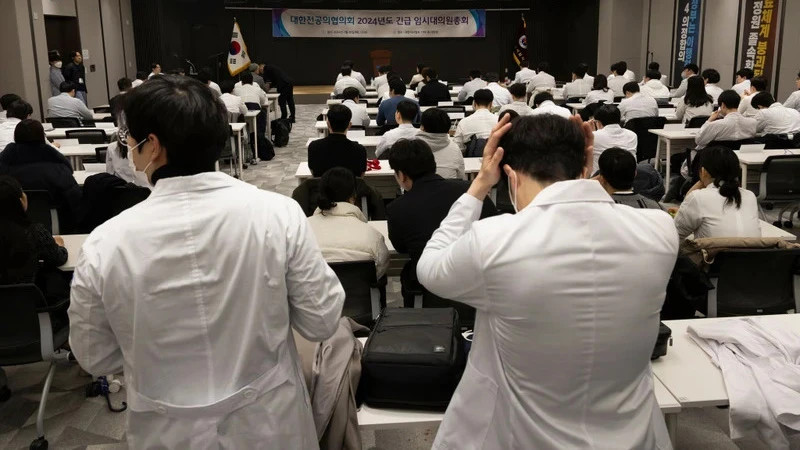The move came as Lim Hyun-taek, the hard-line leader of the Korean Medical Association (KMA), had shown signs of backing down, prompting the KMA to form a committee to hold talks with the government.
In its first meeting, the committee welcomed the government's stance of negotiating with doctors, without setting any preconditions on the content and format of the talks.
The doctors' strike has caused major hospitals in the capital of Seoul to suffer heavy financial losses. According to the Seoul administration, two major hospitals in the capital, including Seoul Medical Centre and Boramae Medical Centre, risk losing nearly 100 billion won (about 71.89 million USD) this year, if the interns do not return to work.
The joy was doubled when medical professors from Seoul National University Hospital (SNU) and its affiliates decided to end their strike, saying they could no longer ignore patients. The surprise decision has eased tensions over the country's healthcare reform plan.
Meanwhile, the RoK Government is cracking down on medical workers who violated regulations. The National Office of Investigation inquired into five doctors, including four from the SNU, for allegedly violating the Medical Services Act, by participating in a collective strike.
According to the head of the National Office of Investigation Woo Jong-soo, the investigation was conducted after receiving complaints from the Ministry of Health and Welfare and numerous patients, of which the five doctors were accused of refusing to serve patients during the strike.
Several doctors from the SNU joined the indefinite strike on June 17, to protest the RoK Government’s plan to increase the enrollment quota for medical universities from 2025. However, faced with public opposition, on June 21, this group of doctors decided to end the strike and return to work at the hospital.
The doctors' strike has caused major hospitals in the capital of Seoul to suffer heavy financial losses. According to the Seoul administration, two major hospitals in the capital, including Seoul Medical Centre and Boramae Medical Centre, risk losing nearly 100 billion won (about 71.89 million USD) this year, if the interns do not return to work.
Of the 203 doctors at Seoul Medical Centre, 22% are interns, while the rate at Boramae is 33.%. The strike has reduced bed occupancy at the two leading medical facilities by more than 20% and the number of outpatients at Boramae Medical Center has dropped by more than 10%.
The above medical centres have been forced to activate emergency management mode and implement cost-cutting measures. The Seoul administration said it plans to inject 45.6 billion won to help the two hospitals maintain necessary medical services for the people.
The healthcare crisis in the RoK broke out in February 2024, after the government announced a plan to increase the enrollment quota for medical students by 2,000 people, starting from the 2025 academic year. More than 12,000 Korean residents and interns did not go to hospitals to protest the plan, causing a severe healthcare crisis.
Despite the wave of resignations by trainee doctors and protests from medical professors and many medical associations, the RoK Government has increased the enrollment quota for medical schools but adjusted the increased level from 2,000 to 1,500 students.
The RoK Government explained that the plan to increase the enrollment quota for medical schools is to respond to the ageing population and allocate more doctors to rural areas.
However, the medical community said that the increase in the enrollment quota weakens the quality of medical education, causing patients' medical costs to increase. They believe the Government should first improve doctors’ salaries, bonuses, and benefits. Meanwhile, the people in the RoK hope the healthcare crisis will soon end, so that medical examination, treatment, and healthcare activities can return to normal.
















